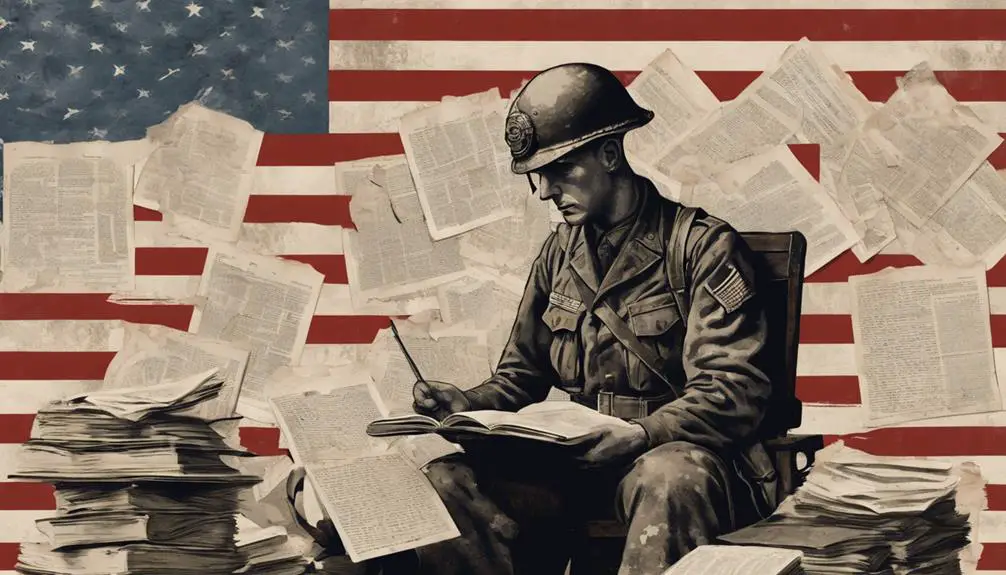When you hear "boot" in a military context, you're likely referring to a new recruit undergoing basic training. This slang term originated in the Navy, symbolizing a rite of passage from civilian to servicemember. As a boot, you'll face intense physical and mental challenges, from grueling morning routines to drills and inspections. You'll be pushed to your limits, but this transformation is key to building resilience, discipline, and camaraderie. You'll learn the importance of military protocol, chain of command, and rank hierarchy. As you navigate this journey, you'll uncover the true meaning of being a boot – and discover the servicemember you're meant to be.
Origins of Military Slang

As you explore the world of military slang, it's important to recognize that its origins can be traced back to the early days of warfare, when soldiers needed a way to communicate quickly and efficiently on the battlefield. This historical context laid the groundwork for a unique linguistic evolution, where soldiers developed a distinct language to convey complex ideas rapidly.
In the heat of battle, clarity and brevity were essential, and military slang emerged as a response to these demands. You'll notice that this language is characterized by abbreviations, acronyms, and colloquialisms, which allowed soldiers to convey complex information swiftly.
For instance, the term 'boot' originated from the Navy, where new recruits were referred to as 'boots' due to their shiny, black boots. Over time, the term evolved to encompass a broader meaning, encompassing any new recruit in the military.
This adaptation is a reflection of the dynamic nature of military slang, which continues to evolve in response to changing circumstances.
Boot Camp Experience
You'll dive headfirst into the immersive world of boot camp, where drill instructors scrutinize every detail of your appearance, from the creases on your uniform to the shine on your boots.
Every morning, you'll rise before dawn to tackle the morning routine, a grueling regimen of physical training, inspections, and drills. Your Drill Sergeant will push you to your limits, testing your endurance, agility, and mental toughness.
You'll learn to master the intricacies of military protocol, from saluting to marching in formation. Every moment is accounted for, every action scrutinized, and every mistake corrected. The atmosphere is intense, with Drill Sergeants shouting orders, correcting your posture, and demanding perfection.
You'll be forced to confront your weaknesses, overcome fears, and build resilience. As you navigate the challenges of boot camp, you'll discover a new sense of discipline, camaraderie, and purpose.
Will you rise to the challenge, or will you falter under the pressure?
New Recruit Life

Your new life as a recruit begins, and with it, a daily routine that's both physically and mentally demanding, pushing you to adapt to a strict schedule and adhere to the military's high standards. You'll face challenges that test your limits, from grueling physical training to intense mental exercises. As you settle into barrack life, you'll encounter adjustments that can be overwhelming, especially for those who've never been away from home.
Here's a breakdown of what to expect during your new recruit life:
| Challenge | Adjustment | Tip |
|---|---|---|
| Homesickness struggles | Feeling isolated and missing family/friends | Stay connected through letters or phone calls |
| Barrack life adjustments | Adapting to shared living space and strict rules | Focus on personal space and prioritize self-care |
| Physical training | Pushing your body to new limits | Pace yourself, stay hydrated, and listen to your body |
| Military protocol | Understanding and following strict rules and etiquette | Pay attention to instructors and ask questions when unsure |
Military Hierarchy Ranks
In the military, you'll navigate a complex web of authority, where understanding the hierarchy of ranks is vital to knowing who to report to, when to salute, and how to address superiors. This hierarchy is essential for maintaining order, discipline, and effective communication within the chain of command.
Here are three key aspects to grasp about military hierarchy ranks:
- Rank Insignia: Each rank has a unique insignia, worn on the uniform, which indicates the individual's position within the hierarchy.
- Chain Command: The chain of command is the line of authority that connects each level of the hierarchy, ensuring that orders are passed down and executed efficiently.
- Clear Communication: Understanding the hierarchy enables clear communication, as you'll know who to report to, and how to address them, avoiding confusion and ensuring smooth operations.
Evolution of a Servicemember

As you progress through the military hierarchy, you'll undergo a metamorphosis from a civilian to a servicemember, shaped by rigorous training, mentorship, and experience. This evolution is marked by significant personal growth and an identity shift, as you adapt to the demands of military life.
| Phase | Characteristics | Outcomes |
|---|---|---|
| Basic Training | Physical and mental challenges, discipline, and obedience | Foundation of military skills and values |
| Advanced Training | Specialized skills, teamwork, and problem-solving | Enhanced capability and confidence |
| Deployment | Real-world application, autonomy, and adaptability | Proven competence and resilience |
| Leadership Roles | Mentorship, decision-making, and responsibility | Developed leadership and strategic thinking |
| Veteran Status | Reflection, wisdom, and legacy | Lasting impact and lifelong connections |
Throughout this journey, you'll develop a new sense of purpose, discipline, and camaraderie. Your experiences will shape your identity, as you evolve from a civilian to a confident, capable, and proud servicemember.
Respect in the Ranks
Earn respect from your peers and superiors by demonstrating a strong work ethic, adhering to the chain of command, and embracing the values of integrity, loyalty, and discipline. As you navigate the military ranks, it's crucial to understand that respect is earned, not given. You'll gain the trust and admiration of your comrades by consistently showing up on time, following orders, and taking initiative.
To foster a sense of respect and camaraderie, remember:
- Maintain a positive attitude: A can-do spirit and willingness to learn go a long way in building strong relationships with your fellow servicemembers.
- Embody Esprit de Corps: Demonstrate pride in your unit and the military as a whole, and encourage others to do the same.
- Respect the Chain of Command: Understand that the chain of command is in place for a reason, and following it ensures the smooth operation of the military machine.
Frequently Asked Questions
What Is the Average Dropout Rate for New Military Recruits?
As you consider enlisting, you're probably wondering about the dropout rate for new military recruits. The answer varies depending on the branch and training program. On average, around 10-15% of recruits don't make it through boot camp.
Recruit struggles often stem from physical or mental challenges, leading to voluntary withdrawals or administrative discharges. Boot camp statistics show that the highest dropout rates occur during the first few weeks of training, with many struggling to adapt to the intense physical and mental demands.
Can You Have Tattoos and Still Enlist in the Military?
As you consider enlisting in the military, you're probably wondering if your tattoos will be a hurdle. The good news is that having tattoos doesn't automatically disqualify you from service.
However, each branch has its own tattoo policies, and some may be stricter than others. You'll need to confirm that your tattoos comply with the branch's policies to avoid enlistment hurdles.
Research the specific guidelines for the branch you're interested in to determine if your tattoos will impact your ability to enlist.
Do Military Personnel Get Paid During Basic Training?
As you take the first step into the military, uncertainty clouds your mind like a thick fog. But, let's clear the air – do military personnel get paid during basic training?
The answer is yes, you'll receive a basic stipend, a training allowance that's a starting point for your military journey. It's a modest amount, but it's a reassuring sign that your sacrifices are valued.
This allowance helps cover your living expenses, giving you one less thing to worry about as you focus on becoming a skilled warrior.
Is It Possible to Choose Your Military Job Specialty?
When selecting a military career, you'll want to choose a job specialty that aligns with your skills and interests. Fortunately, yes, it's possible to choose your military job specialty, which can greatly impact your job satisfaction.
Are There Any Military Programs for Single Parents?
As a single parent considering a military career, you're likely wondering if there are programs to support you. Fortunately, the military offers various Single Parent Support initiatives, providing Family Benefits that cater to your unique needs.
These programs aim to alleviate the challenges of balancing parenthood with military service, ensuring you receive the resources and assistance you need to thrive.
Conclusion
You've now grasped the nuances of military slang, particularly the term 'boot.' From its origins to the grueling boot camp experience, you've seen how new recruits evolve into seasoned servicemembers.
Did you know that over 40% of military personnel come from families with a history of military service? This statistic highlights the strong sense of tradition and duty that drives many to enlist.
As you move forward, remember that respect in the ranks is hard-won, and 'boot' is more than just a slang term – it's a badge of honor.







